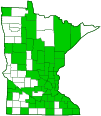Banded Hairstreak
(Satyrium calanus)
Conservation • Description • Habitat • Ecology • Distribution • Taxonomy
Conservation Status |
|
|||||||
| IUCN Red List | not listed |
|||||||
| NatureServe | N5 - Secure S5 - Secure |
|||||||
| Minnesota | not listed |
|||||||
Description |
||
Banded hairstreak is a small to medium-sized butterfly with a wingspan of ⅞″ to 1⅜″. It perches with wings closed and is rarely seen from above. The underside of both wings is grayish-brown or brownish-gray with darker brown spots. On the forewing there is a row of narrow submarginal spots, a row of larger postmedial spots, and a pair of medial spots. The submarginal spots are outlined with white on the inside only and fade out as they approach the wing tip. The postmedial spots are rectangular and more or less connected. They are outlined with white usually on the outside only, rarely also lightly outlined on the inside as well. The hindwing is similarly marked with crescent-shaped submarginal spots, a more jagged line of postmedial spots, and two pair of medial spots. There are also a few to several submarginal orange spots and a blue spot at the outer angle that is not capped with orange. There are two tails near the tip, one long and one short. The eyes are black. The antennae are black-and-white striped with a orange-tipped club. The caterpillar is wide, somewhat flattened, and short, no more than 1″ long. It is highly variable in appearance. It is green with a number of pale stripes at first, turning brown just before pupating. There are usually a pair of subdorsal stripes over the thorax that may continue over the abdomen. Between the subdorsal stripes there is often a dark patch or darker pigment on the second thoracic segment and on abdominal segments 1 and 6 through 10. Each abdominal segment has a subspiracular stripe and a pair of oblique stripes between the subdorsal and subspiracular stripes. Mature caterpillars are found in late spring before the foliage is mature. |
||
Size |
||
Wingspan: ⅞″ to 1⅜″ |
||
Similar Species |
||
Habitat |
||
Woodland edges, open areas adjacent to oak woodlands, parks, and yards |
||
Ecology |
||
Season |
||
One generation: Late June to early August |
||
Behavior |
||
|
||
Life Cycle |
||
During the summer the female lays eggs singly on twigs of host species. The eggs overwinter and hatch in the spring. |
||
Larva Hosts |
||
Catkins and young leaves of mostly oak (Quercus spp.), but also walnut (Juglans spp.), and hickory (Carya spp.) |
||
Adult Food |
||
Nectar of flowers, especially milkweed and dogbane, but also sumac, sweet clover, yarrow, meadowsweet, and New Jersey tea. |
||
Distribution |
||||
|
Sources |
|||
| 7/3/2022 | ||||
Occurrence |
||||
Widespread but uncommon. Population fluctuates. Sometimes locally common but few in number. There are eight hairstreak butterfly species found in Minnesota. All of them are uncommon or rare in the state. Banded hairstreak is the most common of these. |
||||
Taxonomy |
|||
Order |
Lepidoptera (Butterflies and Moths) | ||
Superfamily |
Papilionoidea (Butterflies) | ||
Family |
Lycaenidae (Gossamer-winged Butterflies) | ||
Subfamily |
Theclinae (Hairstreaks) | ||
Tribe |
Eumaeini | ||
| Subtribe | Eumaeina | ||
Genus |
Satyrium (Satyrid Hairstreaks) | ||
Subordinate Taxa |
|||
eastern banded hairstreak (Satyrium calanus falacer) Florida Banded Hairstreak (Satyrium calanus calanus) Godart’s hairstreak (Satyrium calanus godarti) pale Banded Hairstreak (Satyrium calanus albidus) |
|||
Satyrium calanus falacer was formerly considered a separate species, Satyrium falacer. |
|||
Synonyms |
|||
Satyrium falacer |
|||
Common Names |
|||
Banded Hairstreak |
|||
Visitor Photos |
|||||
Share your photo of this insect. |
|||||
| This button not working for you? Simply email us at info@MinnesotaSeasons.com. Attach one or more photos and, if you like, a caption. |
|||||
Paulette G |
|||||
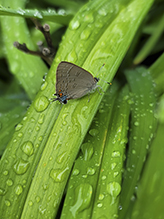 |
|||||
Mike Poeppe |
|||||
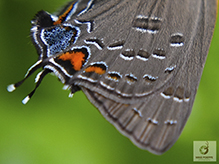 |
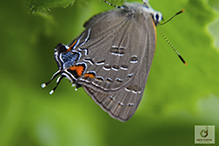 |
||||
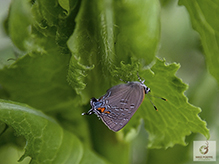 |
|||||
Margot Avey |
|||||
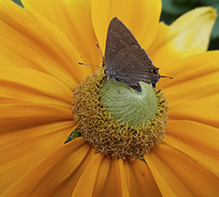 |
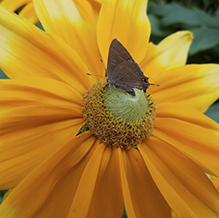 |
||||
John Shier |
|||||
| It was apparent to me that this is one I don't commonly see... At least we have a bright background -- butterfly weed. | 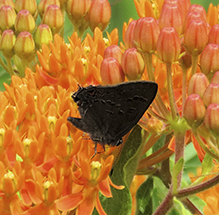 |
||||
MinnesotaSeasons.com Photos |
|||||
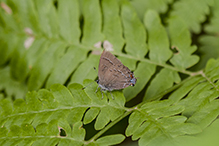 |
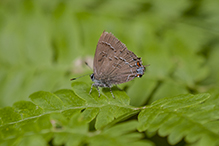 |
||||

Slideshows |
||

Visitor Videos |
|||
Share your video of this insect. |
|||
| This button not working for you? Simply email us at info@MinnesotaSeasons.com. Attach a video, a YouTube link, or a cloud storage link. |
|||
Other Videos |
|||
| Banded Hairstreak Butterfly (Lycaenidae: Satyrium calanus) on Ground Carl Barrentine |
|||
About
Published on Jul 9, 2011 Photographed at the Turtle River State Park, North Dakota (08 July 2011). |
|||
| Banded Hairstreak Nectaring Butterflyweed 2 - July 9, 2014 Don Gagnon |
|||
About
Published on Jul 10, 2014 Banded Hairstreak (Satyrium calanus), nectaring Butterflyweed (Asclepias tuberosa), Part 2, Butterfly Garden, Gagnon Wildlife Habitat, Wednesday afternoon, July 9, 2014, 1:45 PM - Panasonic Lumix DMC-FZ70 00181 / 00182; 50 sec. |
|||
| Banded Hairstreak and Ants MJBugs |
|||
About
Published on Apr 20, 2011 This Banded Hairstreak (Satyrium calanus) larva looks to be tended by ants. Note that there are two discolorations on the larva, one is an ant and the other may be a scar from a parasitoid. |
|||
| Banded Hairstreak Paul Sweet |
|||
About
Published on Dec 2, 2010 Tips for identifying one of N. Illinois' most common butterflies. |
|||


Created: 7/2/2018
Last Updated:
